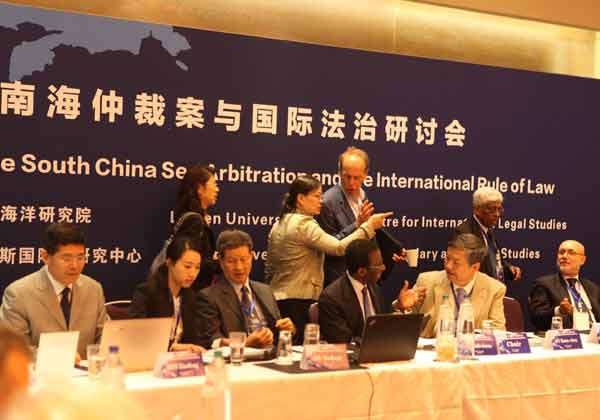
Leading international law experts said any verdict by the Arbitral Tribunal on the South China Sea will be of no legal validity, at a seminar on the South China Sea Arbitration and International Rule of Law in the Hague on Sunday. (Photo by Fu Jing/chinadaily.com.cn)
The Philippines has filed a case against China in the The Hague-based Permanent Court of Arbitration over the South China Sea dispute. But on June 26-27, just days before the court is expected to give its ruling, a group of scholars and experts of international law from China, the United States, the Netherlands, India and other countries participated in a seminar in a hotel just blocks away from the PCA in The Hague to discuss the South China Sea arbitration case and international rule of law. The discussion was organized by Leiden University's Grotius Center for International Legal Studies and the Institute of Boundary and Ocean Studies of Central China's Wuhan University.
Five of the legal experts, including Abdul Koroma, former judge of the United Nation's International Court of Justice, held a press conference to question the PCA's questionable acceptance of Manila's case.
The experts, some of whom have worked as legal advisers to governments and, on some occasions, as arbitrators in the international disputes, agreed that the arbitral tribunal on the South China Sea was not set up with the consent of the disputing parties even though it claimed to have followed the rules of the UN Convention on the Law of the Sea.
Emphasizing that the issue is about territorial and boundary dispute, Beijing has rejected the initiation of Manila, which believes the dispute is about maritime entitlement. Under UNCLOS, the Permanent Court of Arbitration has no jurisdiction on sovereign disputes. And China and the Philippines have never entered into an agreement authorizing the PCA to set up a tribunal to act as an umpire. So, the experts said, China has taken the right measures to safeguard its interests and they are in the spirit of international rule of law.
The experts also warned against the dangerous trend of playing up the role of the PCA. Established more than 100 years ago, the PCA is not a court but an organizer of arbitral tribunals to resolve disputes among member states, and even private parties can file a case in contractual disputes.
As to the tribunal on the South China Sea, there are five arbitrators, four of whom are from Europe. Some experts have questioned why nearly all of them are Europeans and how they can be expected to play a fair role. Since many mistake the PCA as a real court and China has not agreed to appear there, some are under the wrong impression that China has defied international law. But the fact is that the current United Nations legal framework cannot help resolve sovereignty disputes and therefore China doesn't need to turn up for the case.
This was highlighted in the papers the experts especially wrote for the seminar, which also said the international law has its limits in resolving differences between states.
Observers have also warned against another harmful trend-that of some powers using international law to serve for their own purposes and point the finger at their competitors or rivals. Some have even named the United States, blaming it for the escalating tensions in the South China Sea and urging it to play a constructive role by engaging stakeholders in peaceful talks.
As the arbitration has hit a dead end, the experts have urged Manila to withdraw the case and return to the negotiation table with Beijing and other parties in the region. Some of the mare cautiously optimistic that the Philippines would do so, because it is a wise and the best possible way of resolving bilateral disputes. China has always been saying that.
By Fu Jing
The author is deputy chief of China Daily European Bureau.


















































